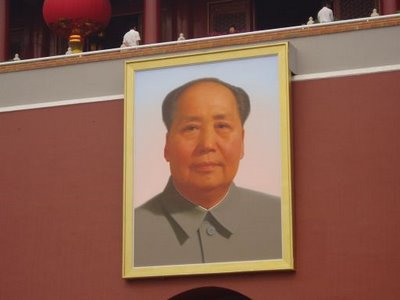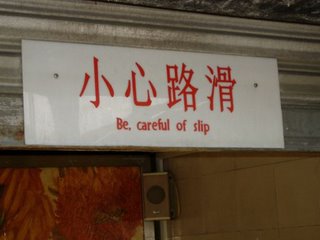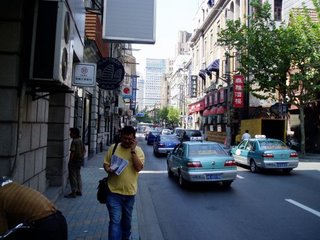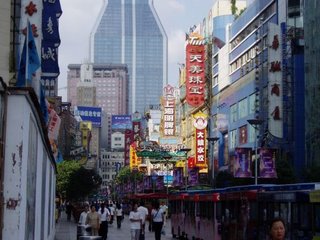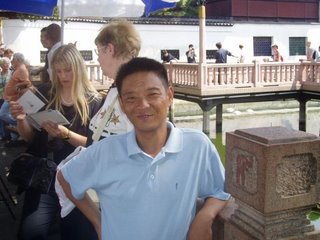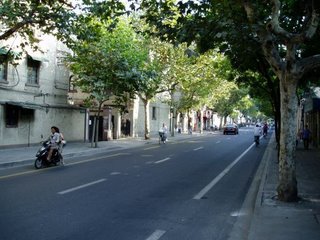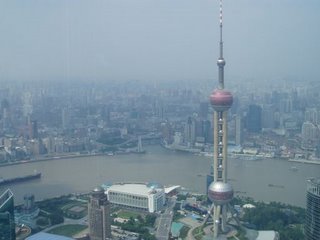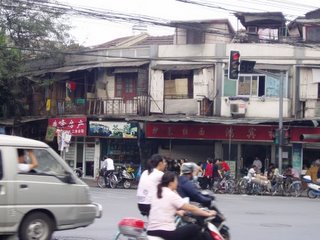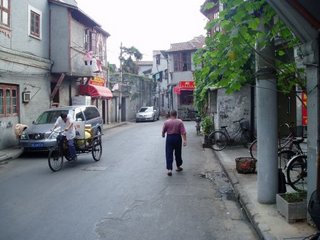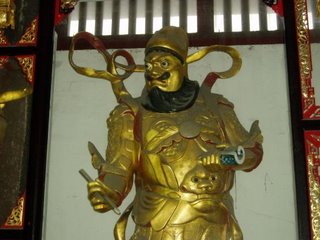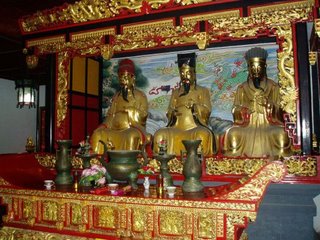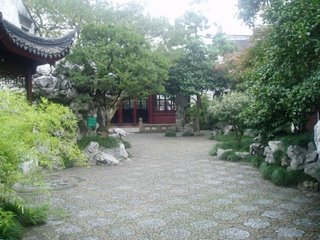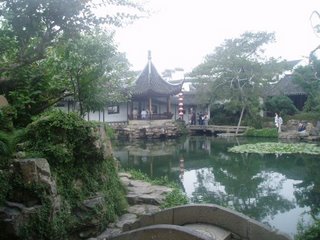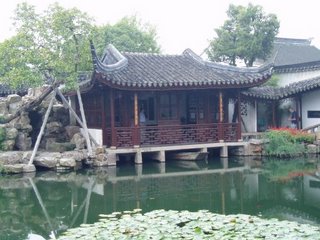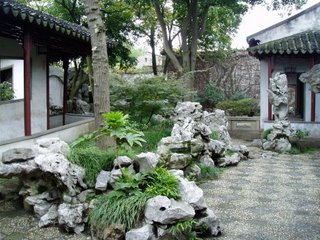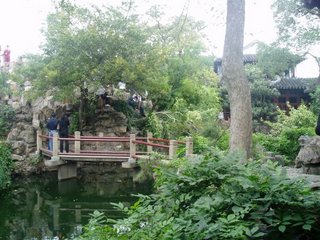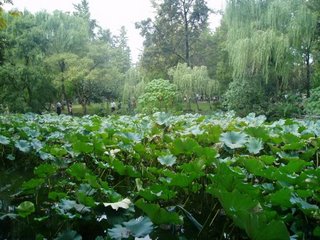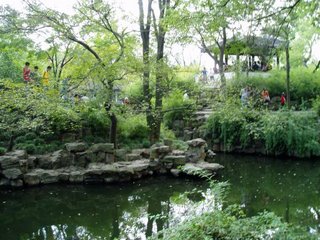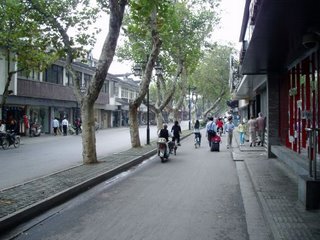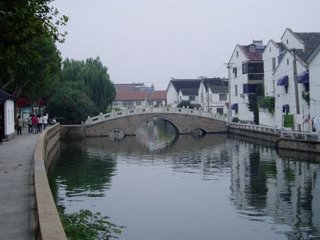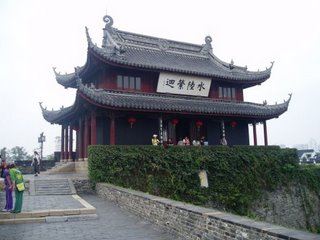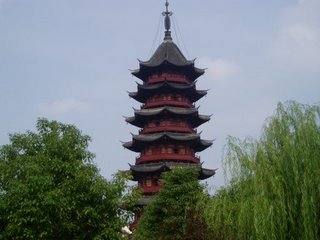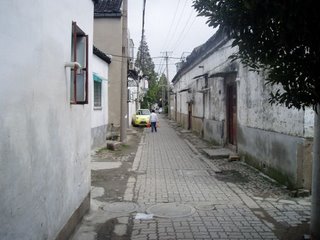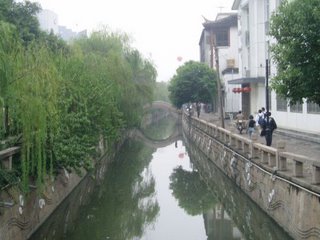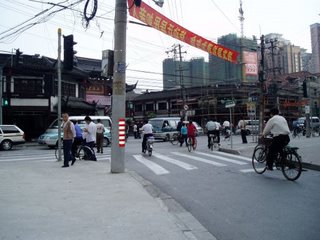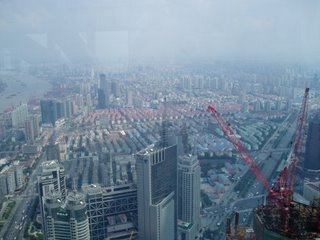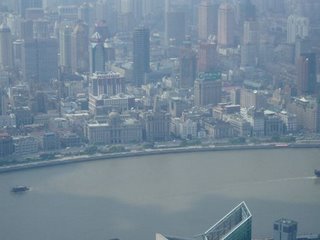 A shop, Hangzhou
A shop, HangzhouWushan is Chinese tourist heaven and something close to hell on Earth for anyone sensitive to loud noises and crowds. Rows of food stalls sell unidentifiable meat on a stick. In some places I know it is chicken because of the many chickens hanging from the stall. I have cause once more to think about why you don’t see many dogs around the place. India is swarming with mangy street dogs but here, bar a few pets, there are no dogs at all. Perhaps they shoot them. Perhaps they do the same to beggars, because I have not seen too many of them either. But China is poor — the flash shops and new developments don’t change that. Take a bus (the Chinese, like the Indians, would consider what we think a full bus luxuriously spacious, with room for at least another 50 people) and you realise that. In rich countries, people do not take public transport because they don’t find it convenient. In poor ones, they don’t have any option.
Off Wushan is an “old street”, a row of restored (or downright fake) Qing houses. Like Yuyuan in Shanghai, this is a tourist trap, but all the same it is fascinating to wander through, to see what is on sale (all sorts of tat but also giant roots in jars, tea of a bewildering variety of types, fake antiques, jewellery and the ubiquitous watches: “hellooooo, Rolex”).
*
I am taking a boat to Suzhou this evening, which is a curious time, I suppose, for a service that is fundamentally for tourists to leave. I will only have an hour or two to see the scenery. There won’t be much. On the train to Hangzhou, all I could see were endless, very flat fields, some paddy, with lonely farmers (wearing those wide, conical hats, to my delight) and the sprawling towns of northern Zhejiang. These were interesting to look at for two reasons. First, the contrast between the enormous tenement blocks, sometimes in groups of a dozen, two dozen identical blocks of what must have been hundreds of flats, and the cute houses, featuring a central spire sort of thing (I don’t know what they’re called but they look very much like the small spire of a country church in Iceland, except with windows). Second, the glimpses of country life I had from my seat: a bicyclist lugging a huge load of wood, old men playing cards, boats on a canal. It was a countryside oddly bereft of livestock, but I think this is because this is largely a cereals-growing area and has little pasture. Maybe it was just an artefact of where the railway passes: whenever you have only a small glimpse of another place you must try not to read too much into it — if a man strikes a dog, it doesn’t mean all Chinese are cruel to animals; if another shoves his wife along a path, it doesn’t mean all men treat women roughly; and so on. Mind you, the stuff about “face” seems to be just so much bollocks. I’ve seen several raging arguments in the street of a kind you just don’t often see back home. In one case, a man threw a small wooden chair at a woman, enraged for a reason that escaped me. Why he was even carrying it — this was the kind of chair you might sit on at primary school or in church — was a mystery, but then so much is.
 Could you all please excuse me, I have a boat to catch
Could you all please excuse me, I have a boat to catch*
 My cabin on the boat to Suzhou
My cabin on the boat to SuzhouIf you could not guess for yourself, Hangzhou downtown is not a good place to be in a hurry on a Saturday afternoon. There are about half as many cabs as people waiting for them, so I walked the length of Yan’an Lu to get to the boat dock. At least I proved an entertainment for the locals, some of whom found me highly amusing, collapsing into giggles. Still, here I am, surrounded by squawking, overexcited Chinese, about to cruise the Grand Canal in a boat just the other side of seaworthy. But it’s the Grand Canal! To me, this is one of the magical parts of China, an enormous project to link the north and south, used since the seventh century to move people and goods through the major population centres of eastern China.
 The Grand Canal at Hangzhou
The Grand Canal at Hangzhou*
I think the shoeshine man may have cursed my shoes. A ragged but not wholly done-in man approached me near my hostel in Shanghai. He gestured with his shoeshine brush. No, no, I said. I don’t want it (although I had become confused about the words for want — yao — and please — qing — so what I was saying was “I not please”, which I suppose could be interpreted as “I’m not inviting you” (but not by him). He sprayed some gunk on my shoes and I said no, no. So he held up two fingers and I said okay. I couldn’t, surely, deny this man the chance to earn 40¢. So he polished the shoes and even glued them in a couple of places that they were becoming loose. He finished and I fished out the two kuai. He was outraged and wrote on the palm of his hand 2–0–0. I said no, you have to be kidding, you said two. No, two tens, he said, 20, but with the glue… But if the Chinese mean 20, they say 20. I said, no way, you can have the two. He was insistent. Look, he gestured, I used glue. I do not know where he was buying glue that cost 180 kuai for two squirts (although it’s done a good job holding my shoes together). I held out two hands, one with the two kuai, the other making a zero. You can have two or nothing, I said. I made as though to walk away. He was furious, spitting with rage. I was tired of this, because I do have a sense of “face” and I don’t like people shouting at me in the street. So I gave him three and turned away. He muttered something ugly sounding and held up his little finger in a way that made it clear this was the Chinese fuck-you. So I said fuck you too and was gone.
The thing is though, my sturdy, comfortable shoes almost overnight became painful to walk in and I developed a blister, which has been inconvenient given how much walking I’ve been doing. To my horror, I find the sole of my shoe has nearly worn through, a disaster in a country whose biggest shoe size would barely fit the average Westerner. My feet are not average and it’s hard enough finding shoes in Brisbane. So I’m praying to Buddha, the Tao, six types of dragon and my ancestors that my poor shoes hold up.
